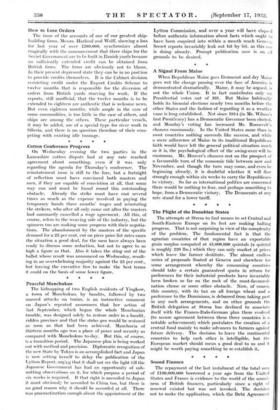The Plight of the Danubian States The attempts at Stresa
to find means to set Central and South-Eastern Europe on its feet are making halting progress. That is not surprising in view of the complexity of the problem. The fundamental fact is that the agrarian countries of that region have an exportable grain surplus computed at 45,000,000 quintals (a quintal is roughly 220 lbs.) which they can only market at prices which leave the farmer destitute. The almost endless series of proposals floated at Geneva and elsewhere for some arrangement whereby the consuming countries should take a certain guaranteed quota in return for preferences for their industrial products have invariably been broken so far on the rock of the most-favoured- nation clause or some other obstacle. Now, of course, this country, with its tax on all foreign wheat and a preference to the Dominions, is debarred from taking part in any such arrangements, and on other grounds the British delegation at Stresa has declined to associate itself with the Franco-Italo-German plan there evolved (to secure agreement between these three countries is a notable achievement) which postulates the creation of a central fund mainly to make advances to farmers against future delivery. The deciSion to leave the 'continental countries to help each other is intelligible, but the European market should mean a good deal to us and it might be worth paying something to re-establish it.






























 Previous page
Previous page